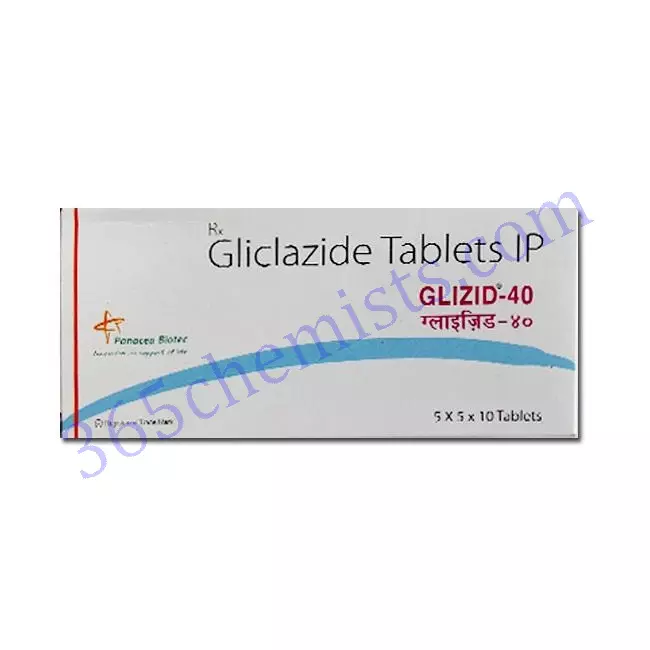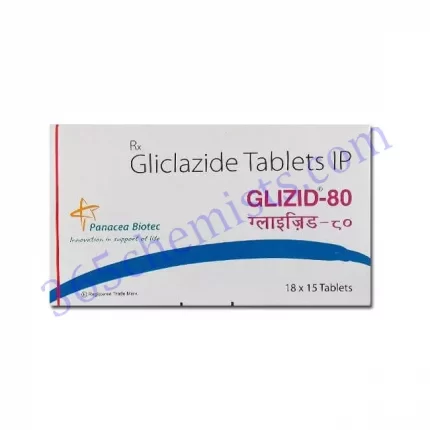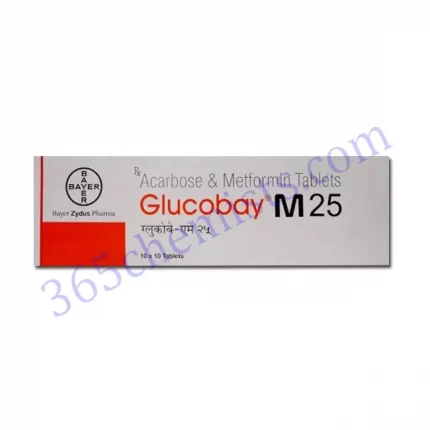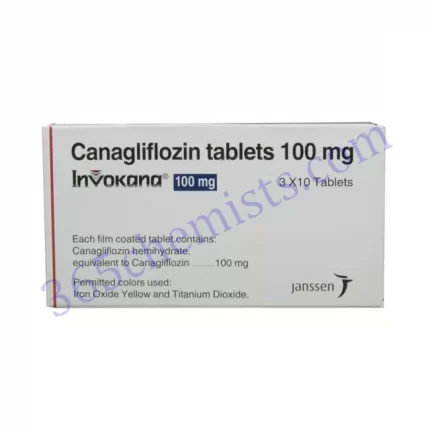Glizid 40 mg
Glizid 40 MG Tablet is an anti-diabetic medicine used in the treatment of type 2 Diabetes mellitus (high levels of sugar in the blood). It helps in controlling blood sugar levels and prevents complications of diabetes such as blindness, kidney damage, stroke (reduced blood supply to your brain), and heart attack. The medicine helps in the production of insulin (a hormone that regulates sugar levels in your blood), which reduces the excess blood sugar levels in your body.
Glizid 40 MG Tablet shows side effects like indigestion and upset stomach. This medicine can occasionally cause low blood sugar levels, the signs being sweating, dizziness, and shivering. To avoid these side effects, eat your meals on time and carry a sugar source (sweets or fruit juice) for immediate relief. Avoid using this medicine if you are allergic to it. Alcohol should be avoided while using this medicine as it can lower your blood glucose levels.
Glizid 40 MG Tablet is recommended to be taken 30 minutes before breakfast. Do not chew or crush the tablet. Take Glizid 40 MG Tablet as per the prescription. For the ease of remembering, take this tablet around the same time every day. Do not stop taking this medicine unless advised by your doctor, even if your sugar levels are normal.
Glizid 40 MG Tablet should not be taken if you have type 1 diabetes (a condition where your body is unable to produce insulin, hence you have to take insulin injections), diabetic ketoacidosis (high amounts of acid in your blood) or severe kidney or liver problems. Inform your doctor about any history of heart problems before taking this medication. If you are pregnant or are breastfeeding, inform your doctor before taking this medicine.
Substitutes
List of substitutes for Glizid 40 MG Tablet
Gazin 40 MG Tablet
Emcure Pharmaceuticals Ltd.
Glyloc 40 MG Tablet
Cadila Pharmaceuticals Ltd.
Glyred 40 MG Tablet
Novartis India Ltd.
Glz 40 MG Tablet
Alembic Ltd.
Nuzide 40 MG Tablet
Intas Pharmaceuticals Ltd.
Side effects
Major & minor side effects for Glizid 40 MG Tablet
Dizziness
Nausea or vomiting
Confusion
Weakness
Sweating
Changes in vision
Decreased heartbeat
Stomach pain
Constipation
Skin rash
Elevated liver enzymes
Low blood sugar levels
Uses of Glizid 40 MG Tablet
What is it prescribed for?
Type II Diabetes Mellitus
Type II Diabetes mellitus (DM) is a condition caused by excess blood sugar levels in your body. This is due to a decreased production of insulin (a hormone that regulates your blood sugar levels) and also due to decreased response of your body to insulin. Glizid 40 MG Tablet is used in type II Diabetes. It works by increasing the release of insulin from your pancreas which helps in lowering your blood sugar levels.
When not to use?
Allergy
Do not take Glizid 40 MG Tablet if you have any allergy to it. Inform your doctor if you experience any symptoms of allergic reactions such as skin rashes, itching/swelling (especially of your face/tongue/throat), severe dizziness or breathing difficulty etc.
Diabetic ketoacidosis
Diabetic ketoacidosis is a complication of diabetes characterized by the overproduction of ketones (blood acids) in your body. Do not take Glizid 40 MG Tablet if you have diabetic ketoacidosis as it can progress to lactic acidosis (increased level of lactic acid in your blood) which is a major health concern.
Severe kidney impairment
Glizid 40 MG Tablet should not be taken if you have any kidney troubles. This medicine is excreted through urine and taking this medicine while you have pre-existing kidney problems can worsen the condition of your kidneys.
Severe liver impairment
Glizid 40 MG Tablet is absorbed in the liver and excreted through urine. If you have any liver problems, use this medicine with extreme caution as it may lead to accumulation and toxicity.
Related Product
Glizid 40mg Tablet
Glizid 80mg Tablet
Warnings
Warnings for special population
Pregnancy
Glizid 40 MG Tablet is usually not advised during pregnancy because it might have significant side effects on your foetus. However, if you are pregnant your doctor may prescribe alternative medicine with the same medicinal effect.
Breast-feeding
Avoid using Glizid 40 MG Tablet if you are breastfeeding. There is no sufficient information available to know whether this medicine can pass into your breast milk. Your doctor may prescribe a safer alternative with the same medicinal effect based on your clinical condition.
General warnings
Hypoglycemia
Hypoglycemia is a condition with decreased blood sugar levels. If you are prone to having low blood sugar level episodes, Glizid 40 MG Tablet should be taken with caution. Inform your doctor about this condition. They will suggest tests to monitor your blood glucose level regularly.
Use in children
Glizid 40 MG Tablet is not recommended for use in children and adolescents below 18 years of age because the safety and efficacy data is not available.
Driving or Operating machines
Glizid 40 MG Tablet may occasionally reduce your blood sugar levels, which may impair your concentration and your ability to perform these activities.
Dosage
Missed Dose
If you missed a dose of Glizid 40 MG Tablet, take it as soon as you remember. If it is almost time for your next, skip the missed dose. Do not take two doses together to make up for a missed dose.
Overdose
Never take more than the prescribed dose of Glizid 40 MG Tablet. If you suspect that you might have taken an overdose of this medicine, go to the nearest emergency medical department/hospital.
Interactions
All drugs interact differently for person to person. You should check all the possible interactions with your doctor before starting any medicine.
Interaction with Alcohol
Description
N/A
Instructions
You should avoid or limit the consumption of alcohol while you are on treatment with Glizid 40 MG Tablet. Consumption of alcohol may increase the risk of side effects such as confusion, dizziness, nausea, vomiting, weakness, and fainting.
Interaction with Medicine
Miconazole
Phenylbutazone
Chlorpromazine
Disease interactions
Heart Disease
If you have problems with the heart and blood vessels, use Glizid 40 MG Tablet with caution as it can increase the risk of heart failure.
Type 1 diabetes mellitus
Glizid 40 MG Tablet works by stimulating the pancreas to produce insulin. Therefore it should not be taken if you have Type I Insulin Dependent Diabetes (a condition where your body is unable to produce insulin, hence you have to take insulin injections).
Hemolytic Anaemia/G6PD Deficiency
Hemolytic Anaemia/G6PD Deficiency is an inherited condition that affects red blood cells, which carry oxygen from your lungs to tissues throughout your body. It occurs due to a deficiency of an enzyme called G6PD (glucose-6-phosphate dehydrogenase) that causes red blood cells to break down prematurely.
Its symptoms are fever, dark urine, stomach pain, fatigue and pale skin. Glizid 40 MG Tablet should be used with caution if you have hemolytic anaemia as it may worsen your condition.
Food interactions
Information not available.
Lab interactions
Information not available.
This is not an exhaustive list of possible drug interactions. You should consult your doctor about all the possible interactions of the drugs you’re taking.
General Instructions
Take Glizid 40 MG Tablet as instructed by your doctor.
Your doctor may change the dose over time based on the therapeutic response and your clinical condition.
You should monitor your blood sugar levels regularly.
Always carry a sugar candy with you to counteract unexpected lowering of blood sugar levels.












